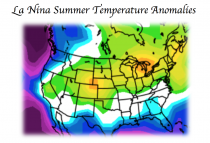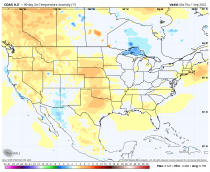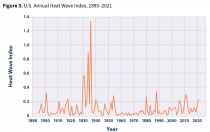It is summer in the Northern Hemisphere again and the mainstream media in the United States are shouting once again that the summer heat is being driven by anthropogenic global warming. Is it?
We recognize that climate changes because climate always changes. Different characteristics may be in place during one year that make it warmer, or colder, than other years. This year, we are experiencing our third consecutive year of La Nina - a substantial cooling of the waters in the central Pacific Ocean due, in part, to a significant increase in winds across the tropical Pacific Ocean. Changing the surface temperature of this large area of tropical waters creates changes in upper atmospheric weather patterns that affect us here in the United States. This year is the strongest La Nina of the recent three-year pattern.
According to Joe D’Aleo of Weatherbell, strong La Nina events have caused hot and dry conditions across the central United States and into the Eastern Seaboard. So, yes, this is what we are experiencing and scientists know exactly why we are experiencing it.
Here is the long term summer average for La Ninas
Here was 2022:
Despite the heat, we are not experiencing the warmest period in all of human history. In fact, we are not experiencing the warmest period in even the last century. A quick perusal of the website of the Environmental Protection Agency (https://www.epa.gov/climate-indicators/climate-change-indicators-heat-waves ) - not an organization one would interpret as being a member of the ‘climate denier’ posse - shows that the United States Annual Heat Wave Index was five times higher in the 1930s (i.e., the Dust Bowl era) than at any time between 1895 and 2020. Using data from the US Global Change Research Program (an organization that I briefly headed), the index describes trends in multi-day extreme heat events across the contiguous 48 states. And if we look at the last eighty years (i.e., the post-Dust Bowl era), no trend exists in this Heat Wave Index.
One thing science can say is that the heat we have been experiencing has been caused by the onset of summer and it will diminish as autumn sets in.
David R. Legates, Ph.D. (Climatology), retired Professor of Climatology and Geography/Spatial Analysis at the University of Delaware, is Director of Research and Education for The Cornwall Alliance for the Stewardship of Creation.





